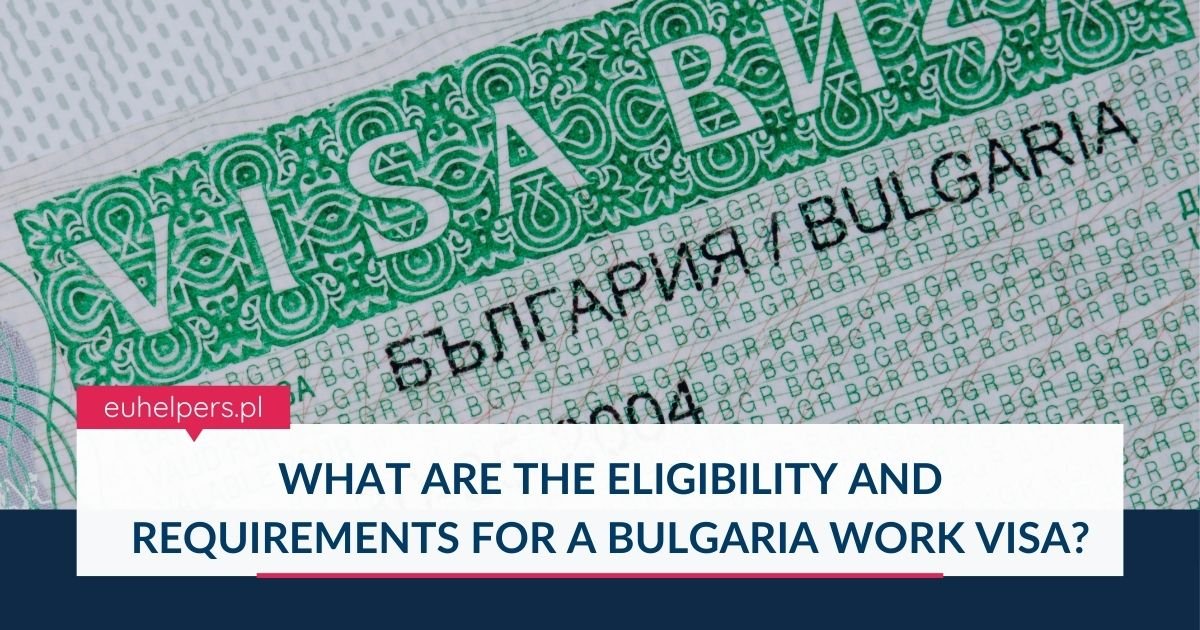Securing a work visa for Bulgaria involves several key steps and requirements. Whether you're a skilled professional or pursuing a new opportunity abroad, understanding the process is essential for a smooth transition. In most cases, obtaining a valid job offer from a Bulgarian employer is the first and most important step.
Eligibility Criteria for a Bulgarian Work Visa
To qualify for a work visa, applicants must meet the following conditions:
-
Valid Job Offer:
A confirmed job offer and signed employment contract from a Bulgarian employer is required. -
Relevant Qualifications and Experience:
Candidates must demonstrate that they have the necessary educational background, professional skills, and experience relevant to the offered position. -
Proof of Financial Means:
Applicants must show they have adequate financial resources to support themselves during their stay. -
Clean Criminal Record:
A certificate of a clean criminal record is generally required as part of the visa application. -
Accommodation in Bulgaria:
Evidence of secured accommodation, such as a rental agreement or invitation letter, must be provided. -
Minimum Salary (for Certain Visa Types):
For visas like the EU Blue Card, applicants must meet specific minimum salary thresholds set by Bulgarian law.
Step 1: Employer Applies for a Work Permit
Before a foreign national can apply for a work visa, the Bulgarian employer must secure a work permit from the National Employment Agency. This involves submitting various documents to justify hiring a non-EU citizen, including:
-
Completed work permit application
-
Company registration and tax compliance certificates
-
A justification for hiring a foreign national
-
Evidence of a labor market test, if applicable (proof that the employer couldn't find a suitable local candidate)
Step 2: Employee Applies for a Type D Visa
Once the work permit is approved, the employee must apply for a Type D long-stay visa at the Bulgarian embassy or consulate in their home country. This visa is required for stays exceeding 90 days and is a prerequisite for obtaining a Bulgarian residence permit.
Required Documents for the Type D Visa Application
Applicants must prepare and submit a complete set of documents, which typically includes:
-
Valid passport and recent passport-size photo
-
Work permit approval (as issued by the Bulgarian Employment Agency)
-
Medical insurance covering the stay
-
Proof of accommodation in Bulgaria
-
Criminal record certificate from their country of residence
-
Proof of financial means
-
Employment contract
-
Any additional documents requested by the consulate
Labor Market Test
In many cases, the employer must conduct a labor market test to demonstrate that there are no suitable Bulgarian or EU candidates available for the position. This step is often required before the work permit is issued and includes posting the job vacancy for a specified period.
Processing Time and Application Tips
-
The processing time for work permits and Type D visas can vary depending on the workload of authorities and the completeness of the application.
-
It’s advisable to begin the application process well in advance, ideally several months before the intended start date of employment.
Arrival and Residence Permit Application
After the Type D visa is issued, the foreign worker can enter Bulgaria. Within 90 days of arrival, they must apply for a residence permit at the Migration Directorate. This permit will allow them to legally reside and work in Bulgaria for the duration of their employment.
Obtaining a Bulgarian work visa requires careful planning, proper documentation, and coordination between the employer and employee. From securing a job offer and undergoing a labor market test to applying for the Type D visa and residence permit, each step plays a vital role in ensuring legal employment in Bulgaria. With a clear understanding of the process and requirements, foreign professionals can confidently take the next step in their career journey in Bulgaria.

